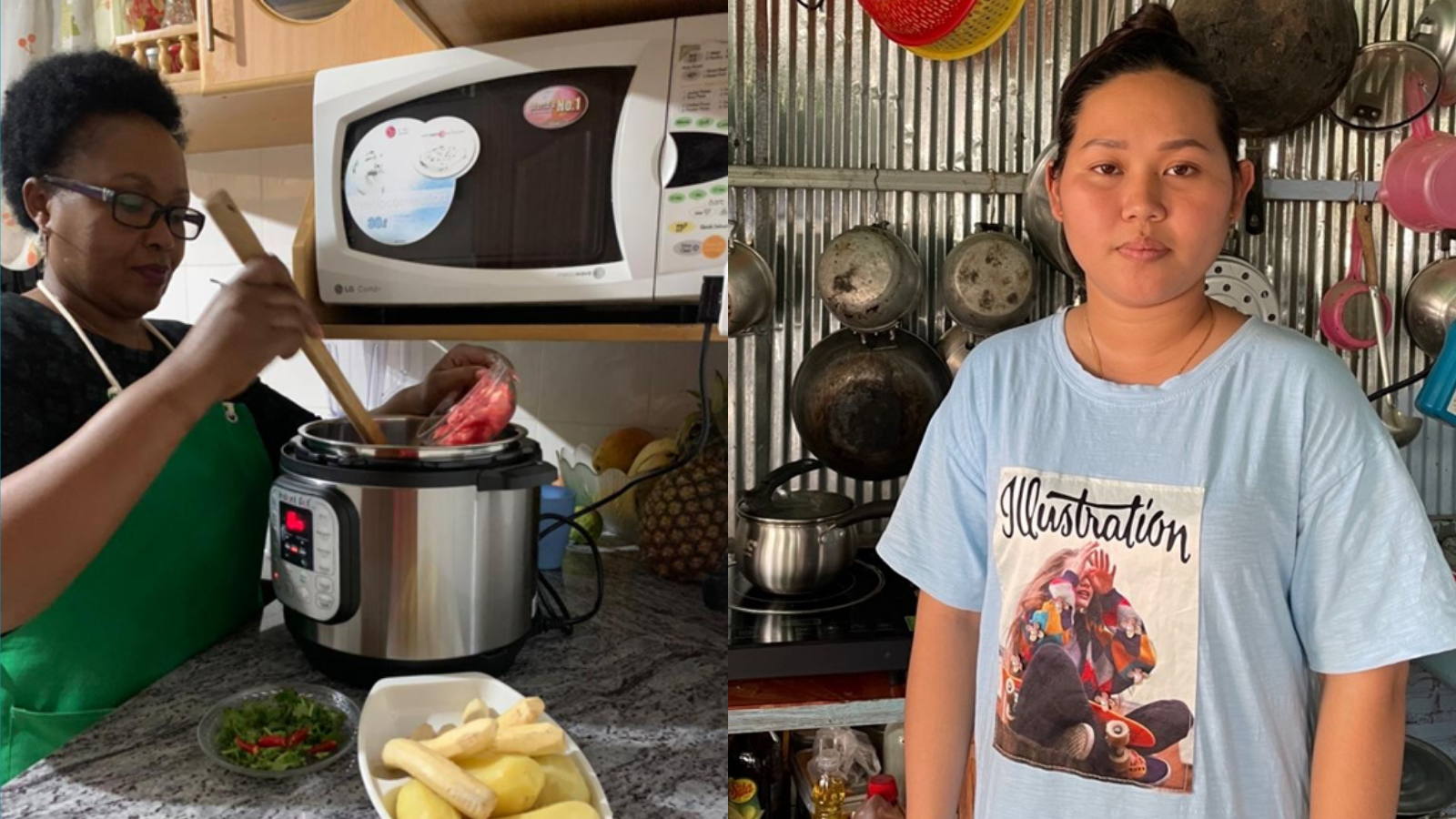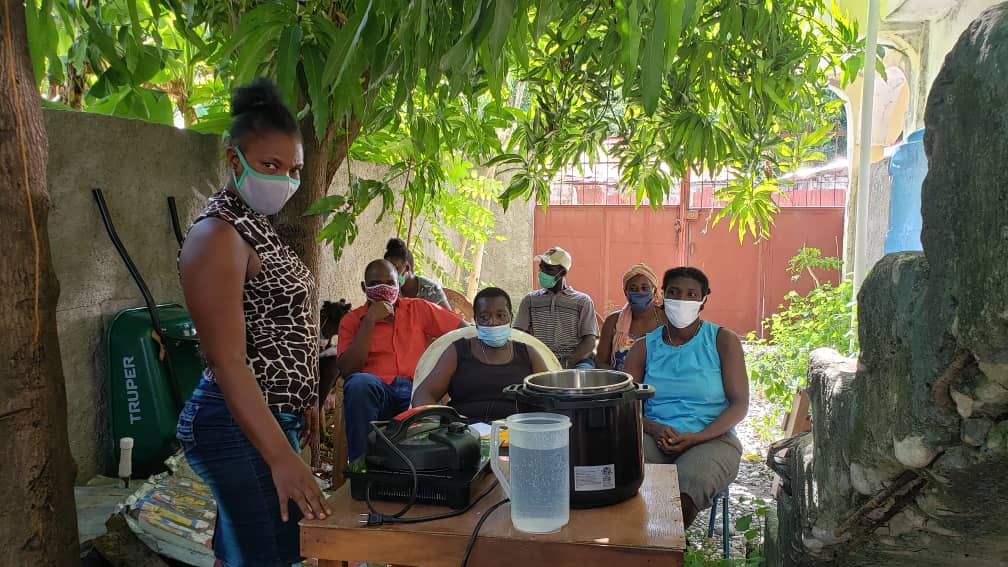
- Date
- 8th March 2021
- Categories
By Shukri Abdulkadir and Joni Cook (Loughborough University).
This year’s theme for International Women’s Day is ‘Generation Equality’, pushing for global action towards securing an equal future for all. Empowering those typically left behind, such as women and often children who carry the health and time burdens associated with cooking with traditional biomass fuels, lies at the heart of the MECS programme and its ambition to accelerate the global transition to clean cooking (Fig. 1). Modern energy cooking services can transform women’s lives by improving their health and reducing the time burden of cooking, thereby opening up new opportunities for income generation, education and leisure. It is also critical for achieving a net zero carbon world by 2050. The MECS programme takes strides towards achieving generation equality by changing the narrative on clean cooking, and spurring global policy leaders to address clean cooking, the global climate crisis, and access to modern energy as an integrated policy imperative.

Gendered impacts of lack of access to clean cooking
The lack of access to modern energy and the effects of human-induced climate change are interlinked and the negative impacts on women’s lives reflect the gender inequalities and inequities in societies. Women often face persistent challenges in accessing modern energy for cooking. This limits their full participation in the energy transition and prevents them from realizing their full potential. According to the latest data, there are still 4 billion people without access to modern cooking energy (ESMAP), resulting in about 4 million premature deaths each year associated with the impacts of Household Air Pollution. Exposure is particularly high among women and young children, who spend the most time at home and take responsibility for preparing food for the household (WHO, 2018). Without access to modern energy for cooking, women and children have to spend large amounts of time and energy collecting traditional fuels to cook meals. Furthermore, in less secure environments, women and children are at risk of injury and violence during fuel gathering.
Climate impacts of lack of access to clean cooking
Cooking with biomass fuels poses a major threat to health, climate and the environment. It is estimated that lack of access to clean cooking accounts for 2% of the global CO2 generation, and represents 25% of the global black carbon contribution to anthropogenic climate forcing (Bond et al., 2013). The loss and degradation of forests due to fuel gathering and extraction has substantial negative impacts on biodiversity and the health and functioning of our ecosystems, thereby exacerbating the negative effects of the global climate crisis. In line with urgent need to reduce global greenhouse gas emissions as set out in the Paris Agreement, the provision of modern energy cooking services for all is critical for achieving a net zero carbon world by 2050. By undertaking this transition in a just manner, the resilience of communities to the growing negative impacts of climate change will be increased whilst empowering those typically left behind.
Gender and climate change
The climate crisis exerts greater negative impacts on sections of global society that are most reliant on natural resources for their livelihoods and lack the capacity and resources to respond and adapt to extreme weather events and other natural hazards. Women are particularly at risk as they represent the majority of the world’s poor (UNFCC). They have limited access to and control of environmental goods and services, are overwhelmingly underrepresented in decision-making, and are typically excluded from the distribution of environmental management benefits. Consequently, women are less able to confront climate change (IUCN). The COVID-19 pandemic has highlighted once again how interlinked climate, health, energy and gender equality are and the crucial element access to modern energy plays in achieving sustainable development. Our working paper outlines seven key strategies that address the intersect of cooking, health, energy, environment and gender within Covid-19 recovery plans.

Despite these challenges, women are frontrunners both in the transition to sustainable energy and the fight against the climate crisis. Empowering women through the transition to clean cooking is integral to MECS activities in focus countries. In Haiti, an 18-month solar PV grid electric cooking project led by MECS-LEIA Challenge Fund awardee EarthSpark deliberately engaged with women and households of rural communities in designing and implementing electric cooking solutions, such as the electric pressure cooker and induction stove. This has resulted in positive changes to the day-to-day lives of women through substantially reducing the time burden associated with traditional biomass-based cooking practices, freeing up time to spend with family, self-care, income generation and other household chores (Fig. 2).
In Nepal, MECS-ECO Challenge Fund awardee IRADe is collaborating with the Women Awareness Center Nepal (WACN), a grass roots organisation working with more than 35,000 women community members to promote social, economic and gender empowerment. Two Nepalese communities that are part of the WACN network were selected for the project to keep women front and centre of project design and help ensure women have access to the benefits accrued from using electric cooking appliances. In rural Myanmar, another MECS-ECO awardee, Geres, are collaborating with a women-led network of entrepreneurs who work as sales agents for the electric cooking appliances, whilst also providing support for the research into their use. Geres reported that “the insights the women entrepreneurs have provided throughout the project, especially regarding sales techniques and customers’ perceptions has been extremely valuable”, highlighting how incorporating gender into project design can lead to mutually beneficial partnerships.
For this year’s International Women’s Day, MECS is placing women in the spotlight who are championing clean cooking in their communities. Women like the late Naomi, who was a vocal champion for modern energy cooking services in Kenya, or Hem Pheakdey, a grandmother from Cambodia that currently takes care of her grandchildren while her children work in the city. Follow MECS on Twitter to join us in celebrating IWD 2021.